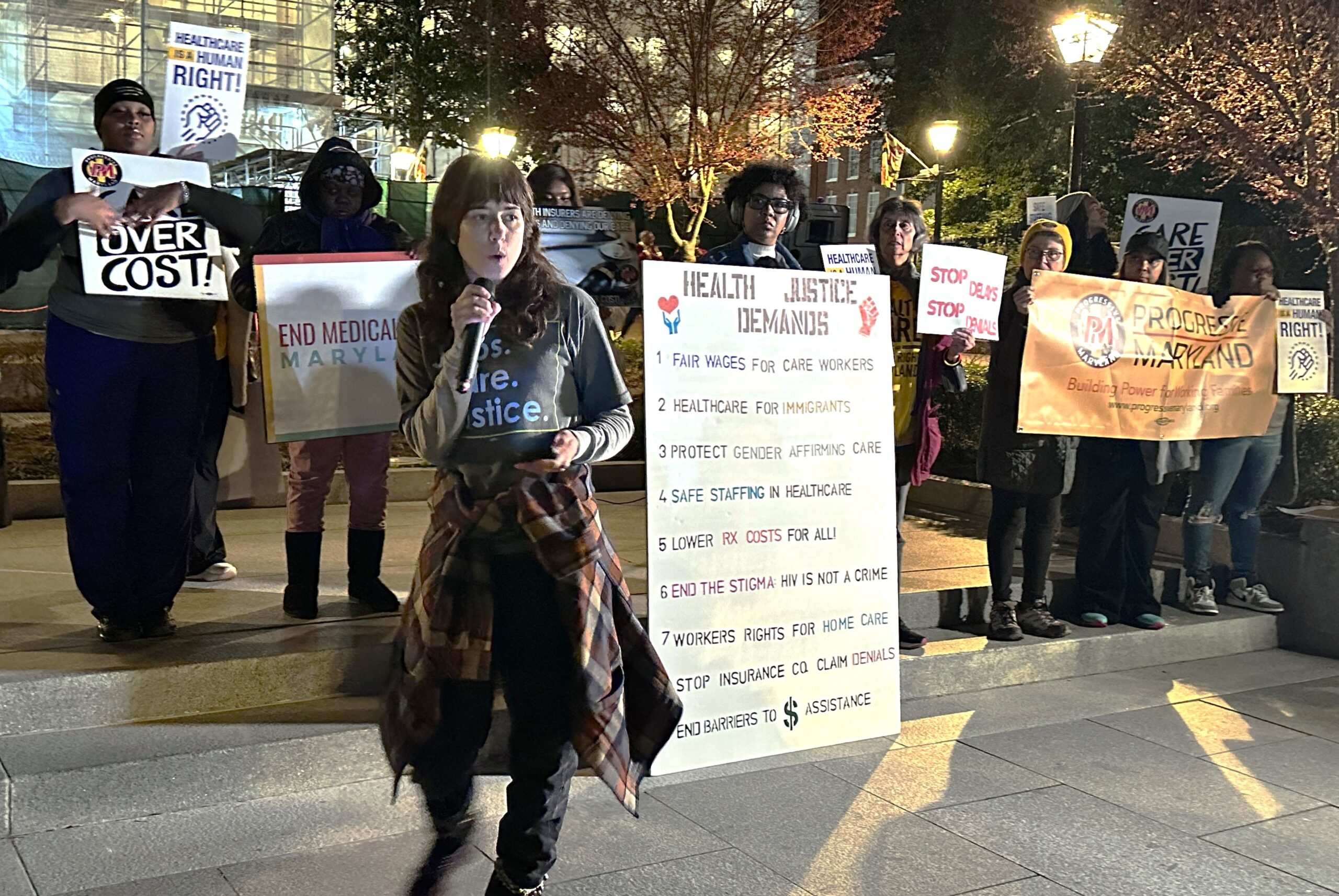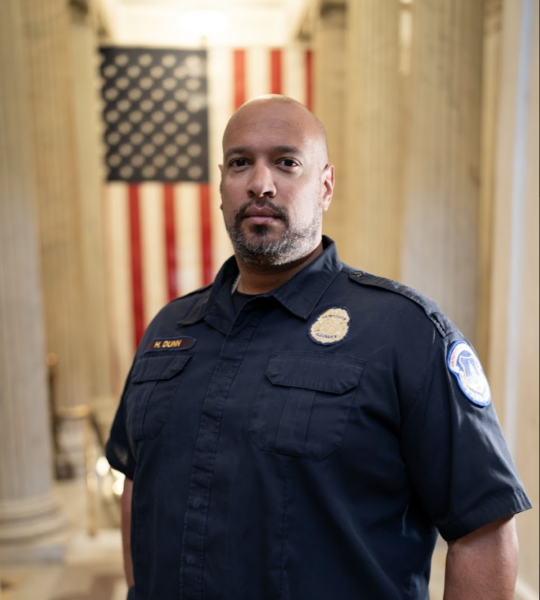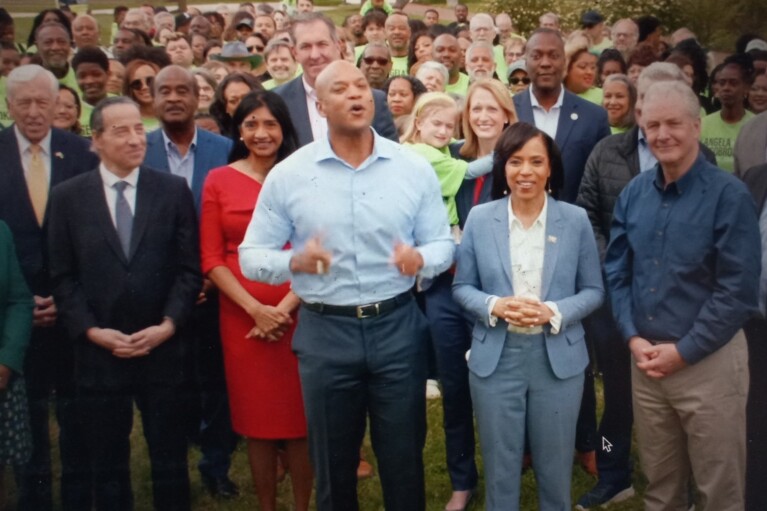Notes: Harry Dunn’s haul, Hogan at the liquor store, health picket in Annapolis, Senate shark tank

In seven weeks as a candidate for Congress, Harry Dunn, the former U.S. Capitol Police officer who battled rioters during the Jan. 6, 2021 insurrection, has raised about $3 million, his campaign told Maryland Matters on Monday.
The Dunn campaign said about 1,300 contributions came from the 3rd congressional district, where Dunn is one of 22 candidates competing for the open seat in the May 14 Democratic primary. The average donation from the 3rd District between Jan. 5, when Dunn declared his candidacy, and last Friday was $26.45, the campaign said.
“I’m so humbled and grateful by the immense support our campaign has received so far and I won’t stop working until families in Maryland get the servant leader they deserve,” Dunn said in a statement released on Tuesday morning.
There is no way to independently verify the campaign’s claims until the next round of campaign finance statements, showing fundraising and spending totals from Jan. 1 to March 31, are filed with the Federal Election Commission on April 15. The campaign would not say how much money Dunn had on hand, though a spokesperson, Joshua Karp, said the total was “a lot.” And he said that 99% of the money the campaign has pulled in is available for use in the primary.
Even if the Dunn campaign’s numbers are exaggerated, it’s clear he’s the leader in the money chase. Through Dec. 31, the two top candidates on the financial front, Sen. Sarah K. Elfreth (D-Anne Arundel) and Sen. Clarence K. Lam (D-Howard and Anne Arundel), had each raised about $400,000 since entering the race to replace retiring U.S. Rep. John Sarbanes (D) in November.

Harry Dunn, a retired U.S. Capitol police officer, is running in the 3rd congressional district Democratic primary. Campaign photo.
Dunn late last week racked up endorsements from four prominent congressional Democrats, U.S. Reps. Adam Schiff (Calif.), Eric Swalwell (Calif.), Bennie Thompson (Miss.) and Jasmine Crockett (Texas). Thompson was the chair of the special congressional committee that investigated the Jan. 6 attack on the Capitol.
“Harry Dunn defended my life on January 6th, and I’m proud to stand beside him and endorse him in his race to represent Maryland’s 3rd Congressional District,” Schiff said in a statement. “We need fighters like Harry in Congress, where he will continue to stand his ground, fight for accountability, and protect our democracy.”
Crockett simply called Dunn “a real life super hero of mine.”
Meanwhile, Berney Flowers, the closest thing to an establishment candidate in the 3rd District GOP primary, sent out a fundraising solicitation Monday morning that underscored the scale of his financial ambitions versus those of the leading Democrats.
“To compete effectively, we aim to raise a minimum of $20,000 by March 5th,” he wrote. “This investment will ensure that our message resonates loudly, signaling to our opponents that we refuse to be silenced. Even modest donations, starting from $10, can make a significant impact by allowing us to produce small yard signs.”
Liquor stores as political surrogates
Former Gov. Larry Hogan (R) stopped by Mills Fine Wine and Spirits in downtown Annapolis on Monday afternoon, armed with a political message, now that he’s a candidate for U.S. Senate.
“Right now, politicians in Annapolis are pushing a bill that would benefit one billionaire at the expense of small business owners across the state like Jerry and Jen Donahoe,” Hogan wrote on a Facebook post that showed him in the store with the proprietors. “Our small business owners deserve leaders who will stand with them. That’s what I did as governor, and that’s exactly what I will do in the Senate.”
That was a not-so-subtle dig at one of the top two Democrats seeking the open Senate seat, U.S. Rep. David Trone (D-6th), co-owner of the Total Wine & More national liquor chain. A bill currently under consideration in the General Assembly would quadruple the number of stores Total Wine could open and operate in Maryland (it currently has two). That bill, sponsored by Del. David Fraser-Hidalgo (D-Montgomery), remains bottled up in the House Economic Matters Committee, but a Senate version has just been introduced by Sen. Antonio Hayes (D-Baltimore City).
Hayes, it must be noted, has endorsed Trone’s principal Democratic primary opponent in the Senate race, Prince George’s County Executive Angela Alsobrooks.
Health care workers picket
Health care workers, patients and advocates formed a “picket line” on Lawyers’Mall in front of the State House Monday night, asking for improved staffing numbers, increased access to health care and lower medical costs.
“Jobs! Care! Justice!” the advocates shouted, waving signs that read “care over costs,” “safe staffing saves lives,” and “health care is a human right.”
The demonstration included a handful of workers’ rights organizations and patient advocacy groups, including Progressive Maryland, End Medical Debt Maryland, Maryland Health Care for All, and 1199 SEIU.
“Health justice isn’t something we win through any one of these fights alone. It is something that we win when we fight these fights together,” Brige Dumais with 1199 SEIU United Health Care Workers East said. “We are tired of being told to be happy with a health care system that treats its workers and its patients like we are disposable.”
The coalition is pushing for lawmakers to pass nine bills to improve “health justice.” Among them are bills that would:
- Allow undocumented immigrants to buy health insurance off the state’s insurance marketplace,
- Expand the authority of a state board to negotiate for lower prescription drug prices for Marylanders,
- Protect gender affirming care and the health care providers who offer gender affirming care,
- increase staffing at Maryland’s health care facilities.
You’re gonna need a bigger boat
Legislative lollygaggers and foot draggers are likely to be unhappy with the lack of movement of most late-filed bills in the Senate.
The Senate is already facing a larger than normal number of bills —1,175 — this session despite caps meant to keep committees from overload. Bills filed after Feb. 5 were all sent to the Senate Rules Committee — a kind of legislative purgatory where sponsors are dependent on the panel to send bills to standing committees for a full hearing.
Getting out is going to be tougher than normal.
Senate President Bill Ferguson (D-Baltimore City) said the other day that there will be a “shark infested moat around the Rules Committee.”
“You know if a bill was not put in on time, it is extremely extremely unlikely to be moving the session except and unless there is a very specific reason,” Ferguson said. “We just have too many bills this year…that still need a lot of work, that need a lot of amendments. That’s going to take time. The more bills that have original hearing, the harder it is to get to the bills that have already been heard and work through to make sure that they are appropriately ready for passage.”
By custom, every bill filed by the deadline is guaranteed a hearing.
Committee votes are not guaranteed.
“I think a lot of people have learned this year with the huge number of bills that timing matters,” said Ferguson. “If something’s going to need a lot of work or has lots of different things that have to be adjusted, that’s what the interim is for. So, it may not get a vote. I think that’s an important point, too, that we will reiterate over and over again. Not every bill gets a vote. Every bill must be considered. But not every bill gets a vote.”






 Creative Commons Attribution
Creative Commons Attribution